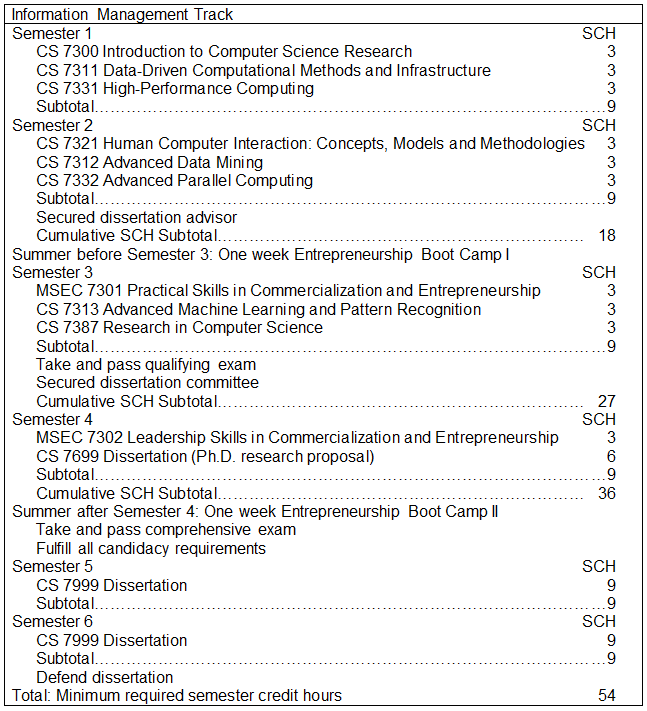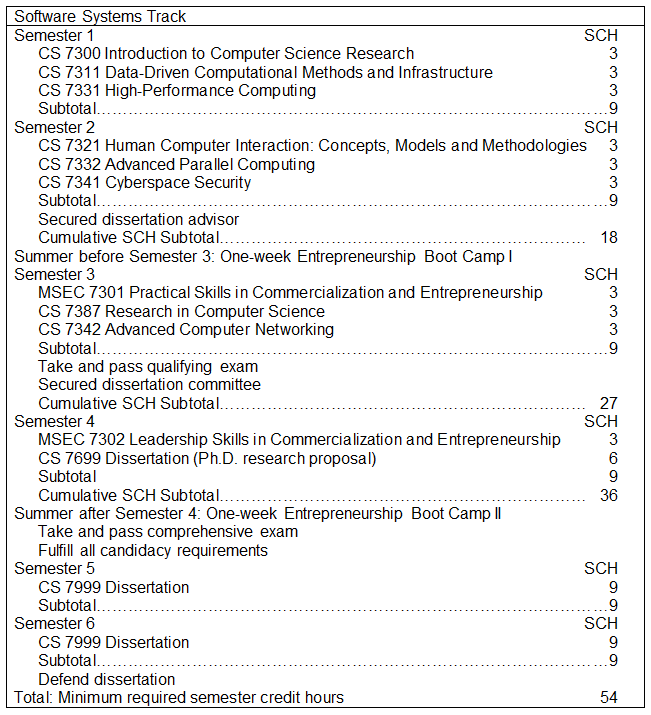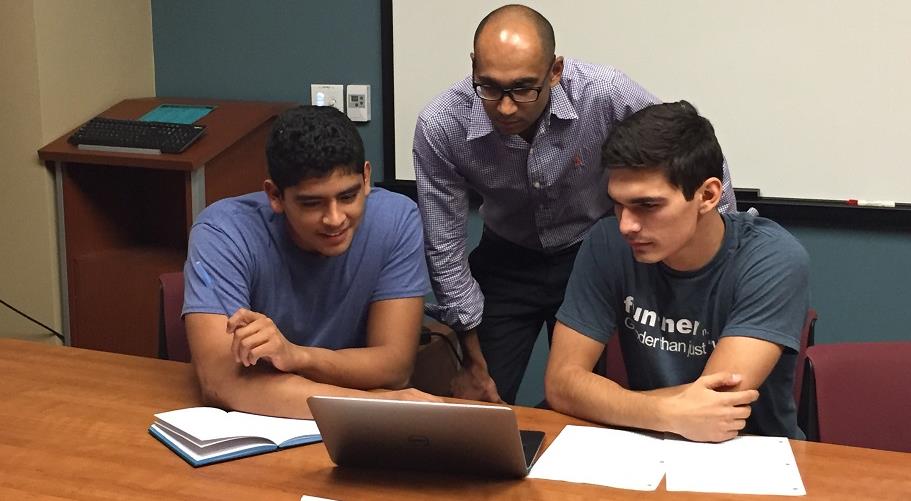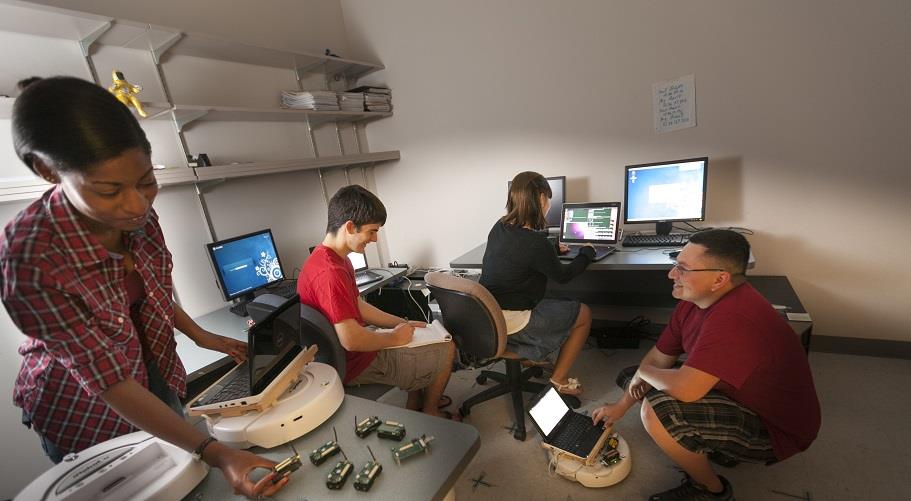Priority application deadline for Fall 2024 admission is Feb 1, 2024. All applicants must contact a doctoral faculty and secure a recommendation letter from a doctoral faculty for the application to be counted as complete
Dissertation Proposal and Proposal Defense
Each Ph.D. student must prepare a written dissertation proposal and defend it orally. Any student who does not defend his/her dissertation proposal by the time 45 semester credit hours have been accrued will be dismissed from the program. If the proposal defense is not passed, the student has the option of taking a second and final defense in the following long semester. Students will be dismissed from the program if they do not pass the proposal defense the second time.
Dissertation Proposal and Proposal Defense Form:
Sample Degree Paths
Assistantships
Assistantships may be awarded to the most qualified doctoral students. Each doctoral assistant who receives an assistantship will be guaranteed three years of salary as an instructional or teaching assistant (IA/TA) at $32,000 per year for a 50% nine-month appointment as long as adequate progress is being made. Adequate progress is defined as receiving a B or higher in each course and taking at least 9 credit hours in each long semester. Tuition is not included in the assistantship. Currently, Texas State University’s graduate tuition and fees for an 18 semester credit hours per year is around $8000. The latest graduate tuition rate can be found in the following link.
Scholarships
There are a few scholarship opportunities that are dedicated just to Ph.D. students.
Dissertation Defense
The dissertation defense consists of two parts. The first part is a public presentation of the dissertation research. The second part of the defense immediately follows the public presentation. It is restricted to the student’s dissertation committee and all core faculty and entails an oral examination of the dissertation research. Approval of the dissertation requires a positive vote from the student’s dissertation advisor and no more than one dissenting vote from the remaining members of the dissertation committee. Notice of the defense presentation will be publicly posted at least two weeks in advance.
If the dissertation defense is not approved, the student has the option of taking a second and final dissertation defense in the following long semester. Students who do not pass the dissertation defense the second time will be dismissed from the program.
Students must pass the dissertation defense by the time 90 semester credit hours have been accrued. The Ph.D. program committee will review each student annually to ascertain his/her progress toward the degree and will consult the student’s dissertation advisor and dissertation committee on this matter as needed. Any student who does not pass the dissertation defense by the time 90 semester credit hours have been accrued will be dismissed from the program.
Dissertation Defense Report Form:
https://www.gradcollege.txst.edu/forms.html
Candidacy
When all requirements for admission to candidacy have been met (completion of required coursework, passing of the qualifying and comprehensive exams, completion of the programming requirement, and submission of an approved dissertation proposal), the Ph.D. program director forwards the Application for Advancement to Candidacy to the Dean of The Graduate College for review and approval. This application form is available on The Graduate College’s website.
A minimum GPA of 3.0 on all coursework undertaken in the doctoral program is required for admission to candidacy. Grades below a B on any graduate coursework cannot be applied toward the Ph.D. degree. Incomplete grades must have been cleared before approval for advancement to candidacy can be granted. No more than six semester credit hours of dissertation research can be taken before advancing to candidacy. No credit will be applied toward a student’s doctoral degree for coursework completed more than five years before the date on which the student is admitted to candidacy. This time limit applies to course credit earned at Texas State as well as course credit transferred to Texas State from other institutions.
Advancement to Candidacy Form:
Prior Learning Assessment
Students in the Ph.D. program in Computer Science can apply up to a maximum of 12 hours of coursework through a prior learning assessment (PLA) evaluation process when they demonstrate mastery of applicable skills and learning outcomes. PLA course credit can be satisfied through experiential learning students gained through work, non-course-based advanced studies, internships, or externships prior to beginning the Computer Science Ph.D. Program. There are a limited number of credits that can be earned through PLA and course transfer combined, which depends on the number of credits in the degree program; for the Computer Science Ph.D. the total is 12. Students who apply for PLA credit must meet the following conditions:
- Full-time students must make the request for PLA credit in the student’s first year in the program. Part-time students must make the request before completing a total of 18 credits.
- The PLA experiences on which the student is basing the request for PLA credits must have occurred within five years of when the request is made.
Comprehensive Examination
Each Ph.D. student must pass a comprehensive examination (it is a combination of the qualifying exam and the proposal defense). This should be done by the time the student has completed 36 semester credit hours for a student who enters with a master's degree and can only be done after identifying the dissertation committee, passing the qualifying exam, fulfilling the programming requirement, and completing all required courses. Any student who does not pass the comprehensive exam by the time 45 semester credit hours have been accrued will be dismissed from the program. If the comprehensive exam is not passed, the student has the option of taking a second and final comprehensive exam in the following long semester. Students will be dismissed from the program if they do not pass the comprehensive exam the second time.
Comprehensive Exam Form:
Programming Requirement
Extensive programming expertise is essential given the applied focus of the Ph.D. program. Hence, all graduating students must have significant experience in designing and implementing a substantial piece of software, which is defined as a piece of software where the student 1) wrote at least 500 statements, 2) employed at least one non-basic data structure (beyond built-in types, arrays, structs, and vectors), and 3) implemented a non-trivial algorithm (more complex than linear search).
There are several ways to satisfy this requirement. For example, a student can take a course with a project that has a large programming component. Alternatively, the student can satisfy this requirement through programming projects that are, for instance, part of a job in industry, independent research, or his/her dissertation. In any of these cases, the student must obtain a support letter from the course instructor, independent-study advisor, manager, or dissertation advisor with a short explanation of how the three software properties stated above are satisfied. The Ph.D. program director must approve this support letter to certify that the student satisfies the programming requirement, which must be met before the student is allowed to defend his/her dissertation proposal.
Qualifying Examination
Ph.D. students must take the qualifying exam after the required breadth courses and CS7300 are completed. The qualifying exam is a 3-hour written exam that is offered at the beginning of a long semester (only offered in the fall semester currently). Students must answer questions from three of the research areas the Ph.D. program is based on (the number of areas can vary from year to year depending on the availability of faculty). In general, the areas will be 1) Data Analytics and Management, 2) Human-Computer Interaction and Computer Vision, 3) High-Performance Computing, 4) Cyber Security and Networking, 5) Software Engineering and Real-time Systems.
The qualifying examination will take place in the second/third week of the fall semester. At the end of the spring semester, a reading list for each of the exam areas will be made available to the students. Each reading list will include at least five research papers that cover fundamental concepts in the given area. The exam will have at least two questions about each area, except software engineering. The students only need to answer one exam question per area. The exam questions can be as general as explaining how a particular algorithm outlined in a certain paper performs or a critical analysis of the results presented. The grading will be on a scale of 1 to 5. The average score over the three areas must be at least 3 to pass the exam. This is an open book exam. All types of notes are allowed but no electronic devices of any sort are allowed. This means no tablets, cell phones, or computers. Annotated papers are encouraged.
Should a student fail the exam, he/she has the option of taking a second and final qualifying exam at the next offering. Students will be dismissed from the program if they do not pass the qualifying exam the second time.
Dissertation Committee
By the time the student has completed 27 semester credit hours and after the dissertation advisor has been assigned and approved by the Dean of The Graduate College, the student, in consultation with his/her dissertation advisor, must establish a dissertation committee that consists of the dissertation advisor, two other doctoral faculty members from the Department, and one external member that satisfies the eligibility rules of doctoral faculty. This means the member should at least has a terminal degree in computer science or related fields, published an average of 2 papers per year in the last five years,
Dissertation Committee Request Form:
Dissertation Advisor
By the time 18 semester credit hours have been accrued, each doctoral student is expected to have secured a qualified dissertation advisor who agrees to advise and mentor the student. The Ph.D. Dissertation/Research Advisor Assignment Form must be completed by the student and the dissertation advisor and approved by the Dean of The Graduate College. This form may be downloaded from The Graduate College’s website.
Dissertation Committee Chair Assignment Form:
https://www.gradcollege.txst.edu/forms.html
Dissertation Registration Approval Form:
Candidacy / Dissertation
The goal of the Ph.D. program is to produce well-rounded applied researchers who have demonstrated breadth in computer science, depth in a specific area of concentration, and enhanced abilities in leadership, innovation, and communication. To ensure that these goals are met, doctoral students must fulfill the requirements and pass the exams outlined in this section. Students who do not meet these requirements within the specified timeframes or fail any of the required exams twice will be dismissed from the program.
The requirements, their dependencies, and the expected semester credit hours (SCHs) to fulfill each of the requirements are shown in the below image. Note that only doctoral-level credit hours count toward the listed SCHs for students entering with a master's. For example, master’s-level background courses that a student may want to take are excluded. But some of those courses are counted for students entering with a bachelor's degree. The requirements are discussed in more detail in the following paragraphs. The commercialization courses and boot camps are optional as of Fall 2022. They can be replaced by taking two additional 7000-level classes.
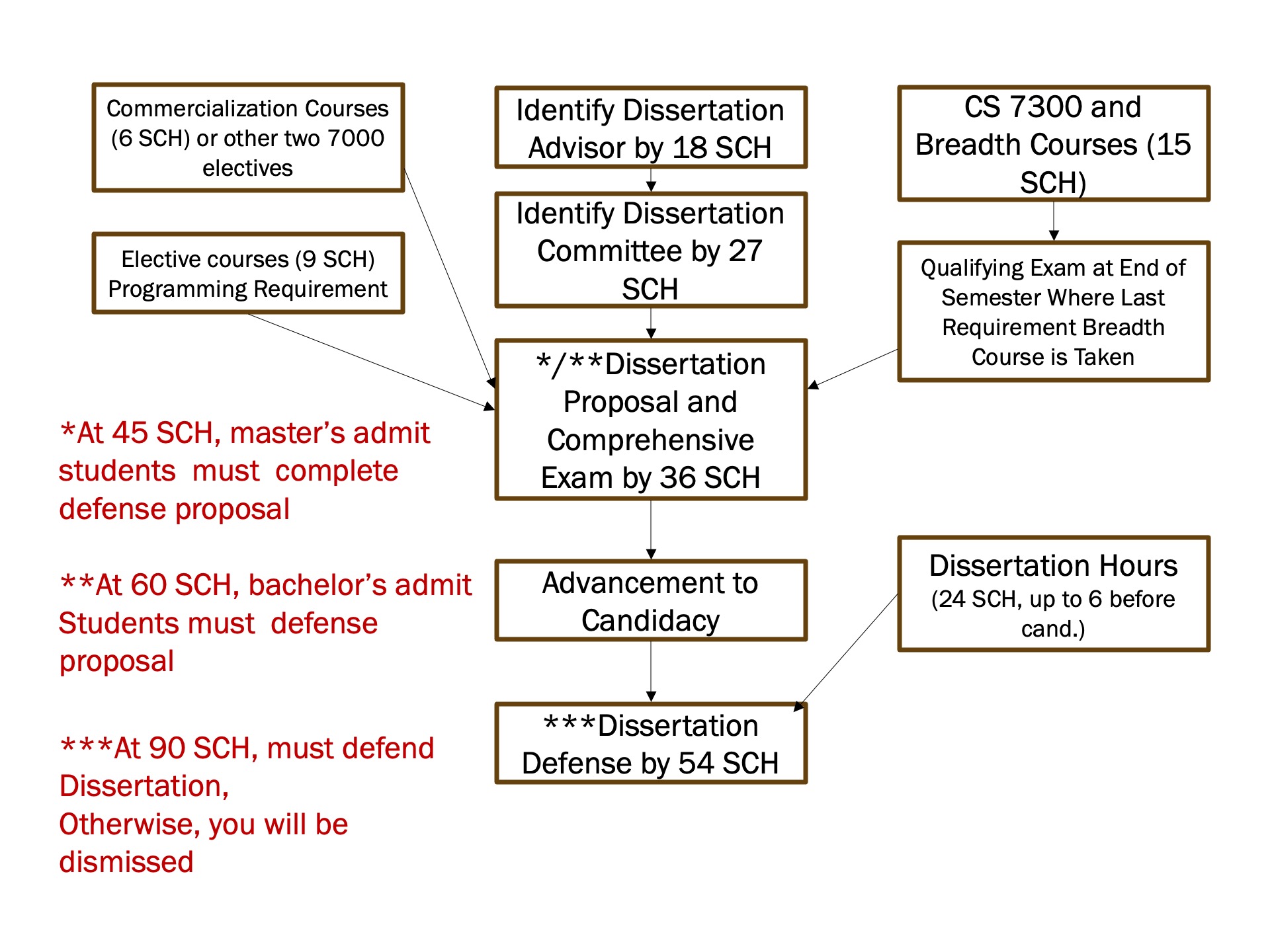
Requirements for doctoral candidacy (dependencies included where applicable)
- Step 1 - Identify dissertation advisor before completing 18 semester credit hours, hereafter referred to as ‘hours’.
- Step 2 - Identify dissertation committee before completing 27 hours.
- Step 3 - Dissertation proposal and comprehensive exam must be taken before completing 36 hours.
- Dependency - Must complete 6 hours of commercialization electives or two electives from CS 7000 course list.
- Dependency - Must complete 9 hours of programming electives.
- Dependency - Qualifying exam must be taken by the end of the semester during which the last required breadth course is completed.
- Dependency for exam - Before the qualifying exam, must complete CS 7300 plus 12 hours of breadth courses.
* Students admitted from an undergraduate program must complete their dissertation proposal before completing 60 hours or face dismissal from the program.
** Students admitted from a graduate program must complete their dissertation proposal before completing 45 hours or face dismissal from the program.
- Step 4 - Advancement to candidacy.
- Step 5 - Dissertation defense must be done before completing 54 hours.
- Dependency - Must complete 24 dissertation hours, up to 6 of these hours may be completed before the dissertation proposal and comprehensive exam.
*** All Doctoral students must defend their dissertation before completing 90 hours or face dismissal from the program.
Curriculum
The main educational objectives of our program are to equip students with
- Technical knowledge in complementary areas of applied computing
- Skills for conducting cutting-edge research that advances the state of the art in applied computing
- Leadership, innovation, and communication skills for multiple career environments
The curriculum emphasizes building complementary and interdisciplinary technical skills in applied computing with the goal of advancing knowledge in a particular field and equipping students with non-technical skills that are essential to navigate multiple career paths. The technical part of the Ph.D. curriculum focuses on applied computing research with two research tracks.
- Software Systems
- High-Performance Computing
- Computer Security and Networking
- Software Engineering/Real-time systems
- Information Management
- Data Analytics and Management
- Human-Computer Interaction
- Computer Vision/Multimedia
- Courses in Information Management Track
- CS 7311 Data-driven Computational Methods and Infrastructure
- CS 7312 Advanced Data Mining
- CS 7313 Advanced Machine Learning and Pattern Recognition
- CS 7314 Bioinformatics (NOT OFFERED)
- CS 7321 Human-Computer Interaction: Concepts, Models, and Methodologies
- CS 7322 Human Factors and Ergonomics (NOT OFFERED)
- CS 7323 Image Processing and Computer Vision
- CS 7324 Human-Computer Interaction: Paradigms for Animation, Visualization, and Virtual/Augmented Reality
- CS 7389A Service Computing (NOT OFFERED)
- CS 7389E Network Analysis (counted as CS731X)
- CS 7387 Computer Science Research
- Courses in Software Systems Track
- CS 7331 High-Performance Computing
- CS 7332 Advanced Parallel Computing
- CS 7333 Advanced Green Computing
- CS 7341 Cyberspace Security
- CS 7342 Advanced Computer Networking
- CS 7343 Mobile Networks and Computing
- CS 7351 Advanced Software Engineering (NOT OFFERED)
- CS 7389B Advanced Software Evolution (NOT OFFERED)
- CS 7389C Real-Time System (counted as CS735X)
- CS 7389D Scalable Systems for SuperComputing (counted as CS733X)
- CS 7389F Secure Cyber-Physical Systems: Cryptography and Machine Learning (counted as CS734X)
- CS 7387 Computer Science Research
- Non-technical courses
- MSEC 7301 Practical Skills in Commercialization and Entrepreneurship
- MSEC 7302 Leadership Skills in Commercialization and Entrepreneurship
- CS 7300 Introduction to Research in Computer Science
- CS 7100 Internship course (one credit only)
- CS 7309 Professional Development for Instructional Assistant (noncredit course only for students who received assistantships)
- Dissertation courses
- CS 7199
- CS 7299
- CS 7399
- CS 7599
- CS 7699
- CS 7999
- Others
- ED 7359 Advanced Quantitative Research Methods
- Math7321 Graph Theory
- Math 7325 Statistics
- Math 7335 Statistics II
Program Overview
The Department of Computer Science at Texas State University is offering a 21st century applied computer science Ph.D. program that incorporates leadership, innovation, and communication to prepare students to navigate multiple career environments. Students are encouraged, but not required to take electives in entrepreneurship and commercialization skills.
The Ph.D. curriculum is centered on two technical tracks: Information Management and Software Systems. The Information Management track encompasses research topics in data analytics and management, human-computer interaction, computer vision, and multimedia. The Software Systems track covers topics in computer security and networking, high-performance computing, real-time system, and software engineering. In addition, the program includes two elective commercialization courses and the implementation of a substantial piece of software.Admissions
The program accepts both full-time and part-time students once per year for fall admission. The priority deadline is Feb 1 and the final deadline for admission is June 1 for international students and June 15, for U.S. students. All applicants must contact a doctoral faculty to secure a recommendation letter from the doctoral faculty for the application to be counted as complete.
The program-specific admission standards include the following.
- All applicants must have completed a bachelor’s degree in computer science or a closely related discipline. Up to 24 credit hours can be waived for students who enter with a master’s degree in computer science or a closely related discipline.
- Applicants with a bachelor’s degree must have a competitive grade-point average (GPA) on their most recent 60 semester hours of coursework. Applicants with a master’s degree must have a competitive GPA in the MS-level coursework.
- All applicants must have an official Graduate Record Examination (GRE) submitted to the Texas State Graduate College with competitive scores in the verbal reasoning and quantitative reasoning sections.
In addition, international applicants must submit the following.
- An official diploma or degree certificate and a certified English translation thereof showing the type of degree earned and the date the degree was conferred, as required by The Graduate College from all international applicants.
- If the final degree (bachelor’s or master’s) of the applicant is from a country where English is not the official primary language, the applicant must have a Test of English as a Foreign Language (TOEFL) score of at least 85 or IELTS scores with 6.5 overall and minimum individual module scores of 6.0.
- Proof of sufficient financial resources for their educational and personal expenses as required by The Graduate College from all international applicants. The official offer of a Ph.D. assistantship can be used to satisfy this requirement.
Other requirements include the following.
- Three letters of recommendation must be submitted directly from professionals (university professors or direct supervisors) who are qualified to assess the applicant’s academic abilities.
- A written statement of research interests and goals.
- A complete and up-to-date curriculum vitae (résumé).
- All official academic transcripts from each college or university attended must be sent to the Texas State University Graduate College. Additional details are specified by The Graduate College.
- A completed application (http://www.gradcollege.txstate.edu/programs/cs-phd.html).
- A non-refundable $55 application is required of all applicants.
- An additional international evaluation fee of $35 (in U.S. currency) is required if the application is considered for admission based on foreign credentials.
- Application fee payments can be submitted securely through an online portal or mailed via check/money order in U.S. currency made payable to Texas State University.
| Category | Semester Credit Hours, Entering with Bachelor’s | Semester Credit Hours, Entering with Master’s |
| Required Courses | 39 | 15 |
| Electives | 15 | 15 |
| Dissertation | 24 | 24 |
| TOTAL | 78 | 54 |
- Total of 54 semester credit hours (SCH) for a student entering with a master’s degree and 78 SCH for a student entering with a bachelor’s degree Note that students entering with a bachelor's degree must take an additional 24 SCH of graduate courses taken from 5000 or 7000 level.
- 15 SCH required courses (breadth)
- CS7300 Introduction to Computer Science Research (3 SCH)
- Four CS7000-level courses that cover both research tracks (12 SCH)
- 15 SCH elective courses (depth)
- 24 SCH dissertation
- Additional requirements
- Programming requirement
- Qualifying examination
- Comprehensive examination
